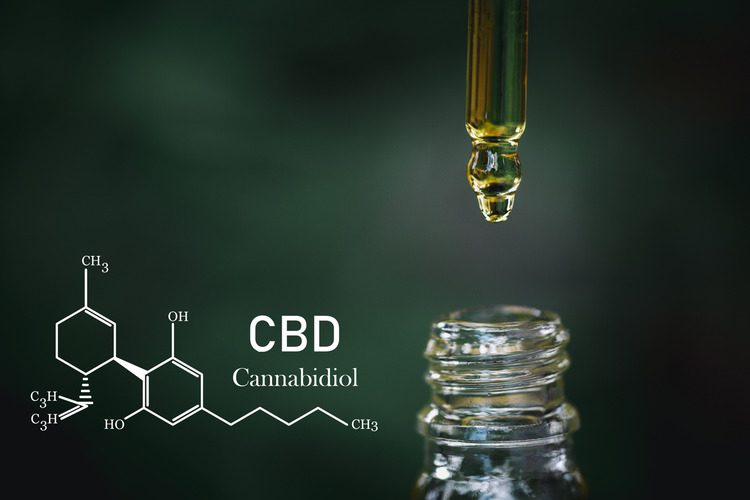Cannabidiol (CBD) has rapidly gained popularity in recent years, with many turning to this non-psychoactive compound for relief from anxiety, pain, and sleep disturbances. CBD is celebrated for its therapeutic potential, yet for individuals in recovery from substance use disorder (SUD) or alcohol use disorder (AUD), a serious question must be answered: is it safe or advisable to use CBD products? Here’s what you should know to make an informed decision.
How Does CBD Affect You?
CBD is a compound found in both hemp and cannabis, which are both Cannabis sativa species. Unlike marijuana, which contains delta-9 tetrahydrocannabinol (THC), it doesn’t cause a “high.” The Centers for Disease Control and Prevention explains that CBD is “non-impairing”—meaning it doesn’t affect a person’s ability to think or function in the way that THC does.
Research indicates that CBD interacts with the body’s endocannabinoid system, which helps regulate mood, pain, and sleep. Harvard Health reports that CBD exhibits anti-inflammatory, analgesic, and anxiolytic properties, making it a possible option for people seeking natural alternatives to traditional medications.
Potential Benefits of CBD in Recovery
According to the Association of American Medical Colleges (AAMC), in 2022, “64% of U.S. adults reported trying a CBD product—and nearly half of those did so at a doctor’s suggestion, according to a Forbes Health survey.” Here’s a small sample of research regarding therapeutic CBD applications.
Manage Anxiety and Stress
Anxiety is one of the most common triggers for relapse. Preliminary studies indicate that CBD may help reduce anxiety and stress, making it easier for individuals to manage emotional triggers in recovery. CBD’s anxiolytic (anxiety-reducing) effects could be particularly helpful for those in early recovery who experience heightened feelings of unease or agitation.
Alleviate Chronic Pain
This is another concern for individuals in recovery, especially those who have used substances to self-medicate pain in the past. “Increasingly, human studies are substantiating the claims that CBD helps control pain,” Harvard notes. “One animal study from the European Journal of Pain suggests CBD could help lower pain and inflammation due to arthritis when applied to skin. Other research identifies how CBD may inhibit inflammatory and neuropathic pain, which are difficult to treat.”
Reduce Cravings
As a form of medication-assisted treatment, CBD might play a role in reducing cravings, particularly for people recovering from opioid or stimulant addiction. In mild cases of AUD or SUD, it could be a useful tool for supporting long-term recovery and preventing relapse.
Supporting Sleep
Sleep disorders such as insomnia, disrupted sleep cycles, or vivid dreams are common in withdrawal and early recovery. Research suggests that CBD helps some people achieve better sleep, which could contribute to overall well-being and resilience.
Risks of CBD in Recovery
While CBD itself isn’t addictive, it does pose certain risks, especially for individuals recovering from addiction. Here are some important factors to keep in mind
Inconsistent Product Quality Control
Iowa’s laws regarding CBD products derived from hemp and cannabis are complex. While “consumable hemp” and “medical cannabis” aren’t the same thing, in 2024, the state stipulated that “consumable hemp products manufactured or sold in Iowa must contain 0.3% or less total THC to be legal.”
However, the CBD market remains largely unregulated, which leads to significant variability in product quality, and THC contamination is a primary concern. Even at 0.3%, this level can still have psychoactive effects in some people, potentially triggering cravings or relapse. In unregulated markets, especially without standardized testing, there’s also the risk of mislabeled CBD products containing more THC than advertised or harmful contaminants such as pesticides, heavy metals, or other toxic substances.
If you decide to use CBD, always opt for reputable brands that offer third-party lab results. These results can confirm the THC content and overall purity of the product, reducing the risk of unintended exposure to harmful substances.
Psychological Dependence and Risk of Misuse
While CBD itself is non-addictive, relying on any substance—whether for therapeutic purposes or not—may conflict with certain recovery philosophies. For example, 12-Step programs, which emphasize complete abstinence from all mind-altering substances, might see regular CBD use as counterproductive to long-term sobriety.
Even if CBD doesn’t produce a “high,” habitual use of any compound could potentially lead to psychological dependence or, at the very least, serve as a psychological crutch during difficult moments.
Side Effects and Drug Interactions
The Centers for Disease Control and Prevention indicates that common CBD side effects include drowsiness, changes in appetite, mood changes, and gastrointestinal disturbances. While these effects may seem mild, they could compromise daily functioning or cause distress for individuals in recovery.
CBD compounds can also interfere with the performance of antidepressants, anti-anxiety medications, and painkillers, which are commonly prescribed in addiction recovery. Additionally, the AAMC indicates that high doses of CBD “were associated with signs of liver damage in a small number of study participants.” Always consult with a healthcare provider before adding CBD to your recovery program.
Ivory Plains’ Evidence-Based Treatment Approach
Alternative wellness therapies are often helpful in recovery. However, each person is unique. It’s crucial to evaluate whether using CBD products aligns with your personal sobriety goals, especially if your continuum of care plan advocates for complete abstinence.
This is the evidence-based approach you can trust from our addiction rehabilitation program in Adair, Iowa. Our board-certified professionals provide education and guidance regarding recovery techniques that are reliable and effective. Call our admissions team to learn more about our treatment philosophy.





